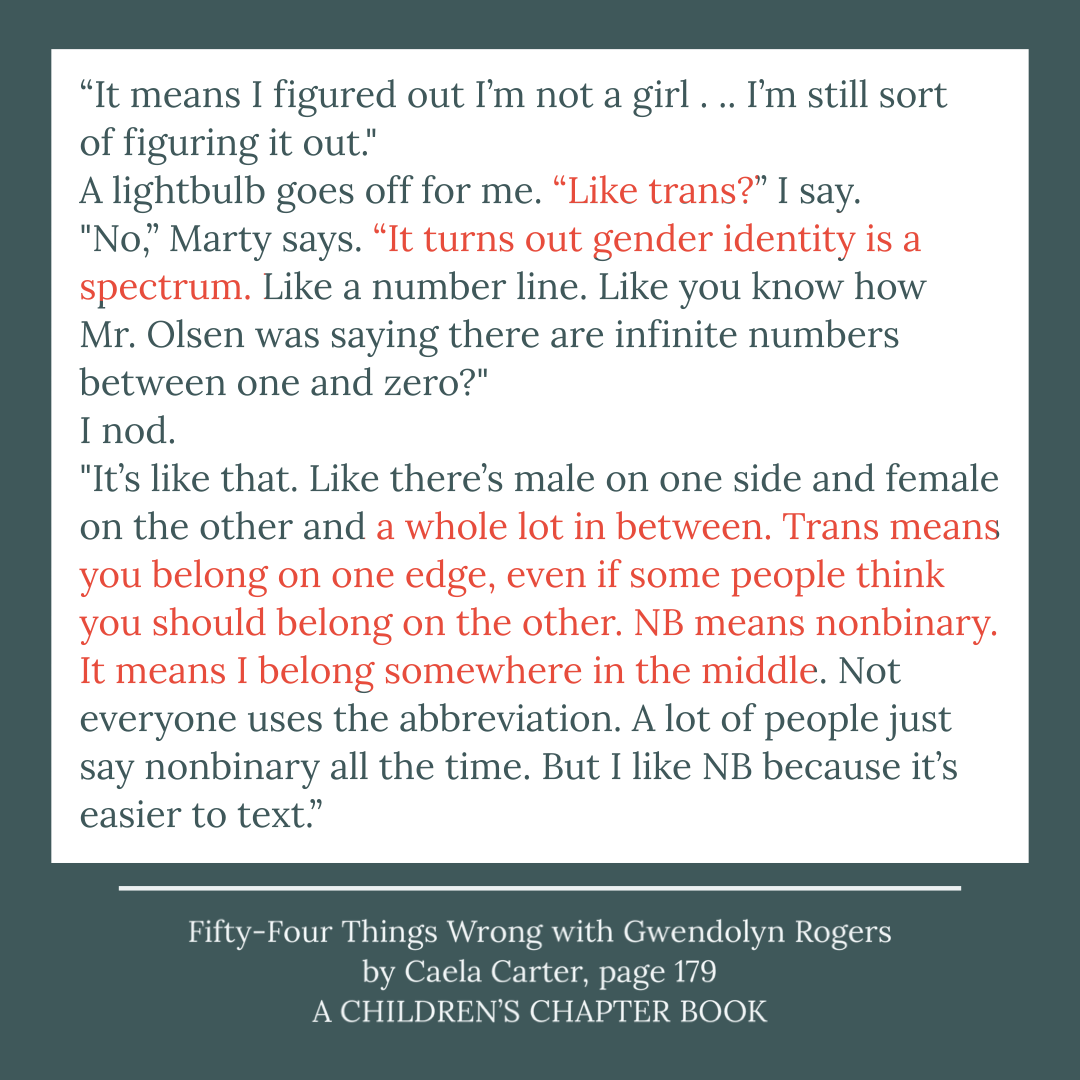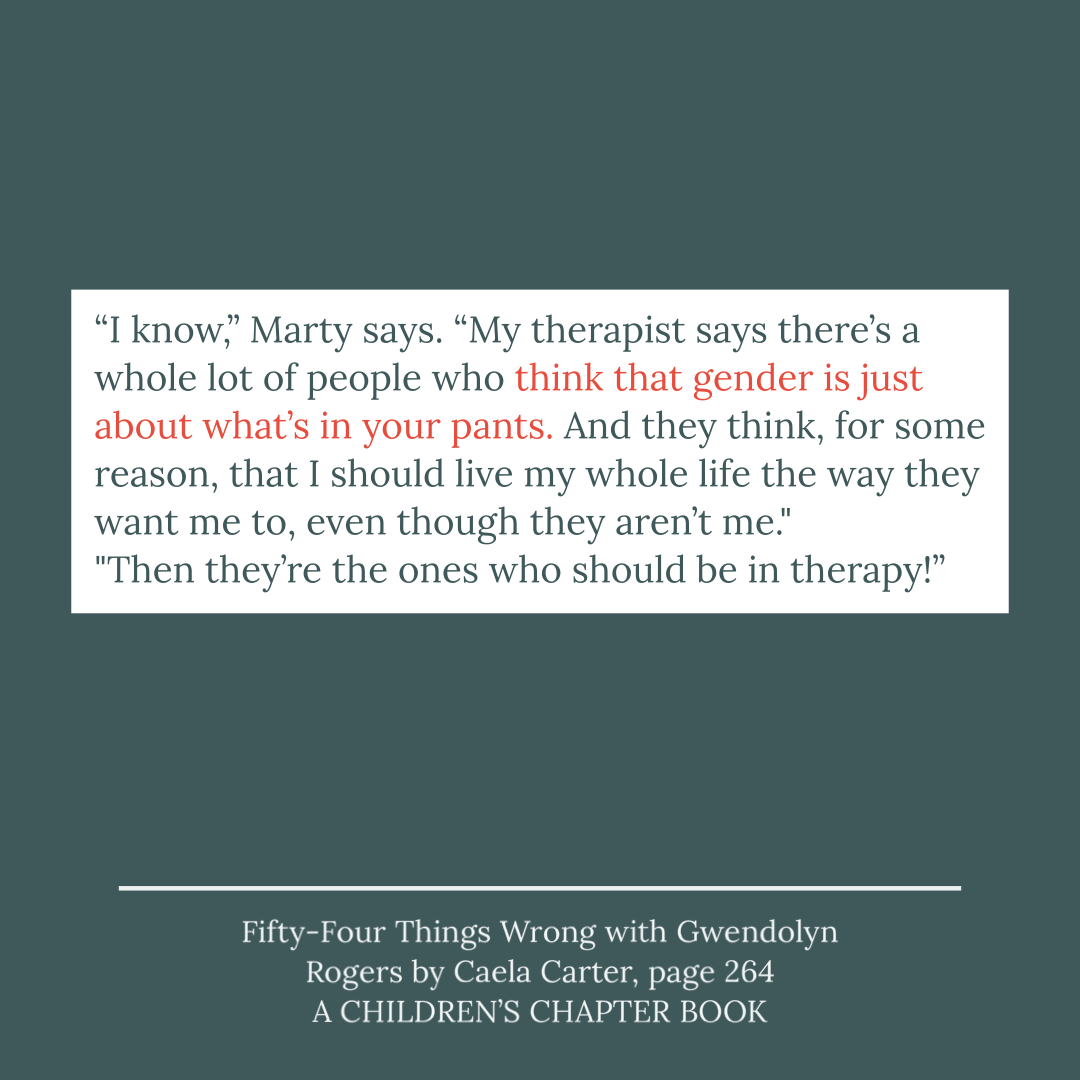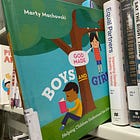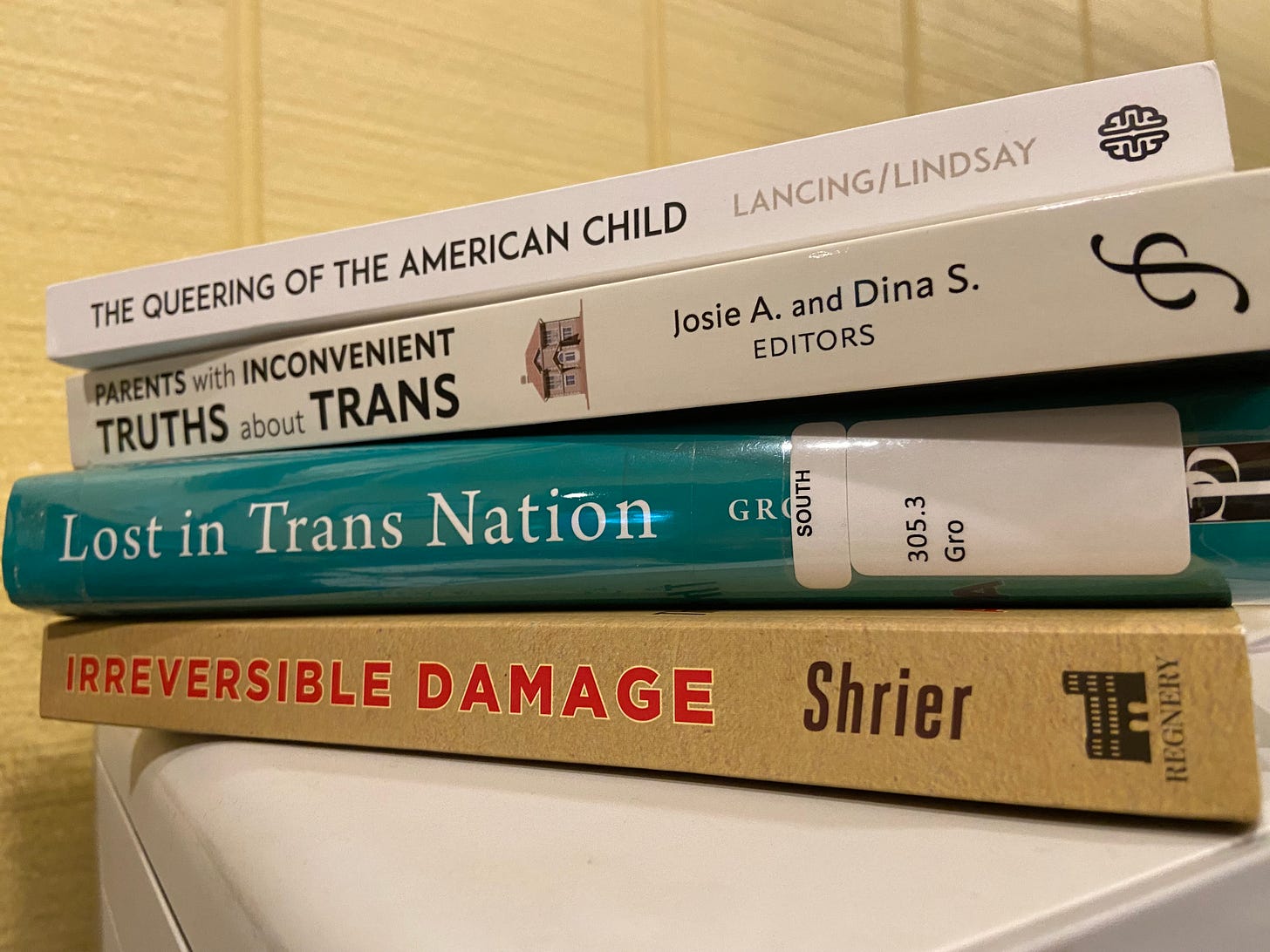Why Conroe ISD needs a new library policy.
Data, talking points, and your reminder about the Level 3 hearing about Lily and Dunkin.
Don’t forget, tomorrow, April 16th is the Level 3 hearing about the book Lily and Dunkin, a book still available to 7th graders. Find more information about the Conroe ISD school board meeting, the book being considered, and how to sign up for public comment in last week’s post which you can access here:
Many children’s books with gender confusion themes are subtle.
Lily and Dunkin is the tip of the iceberg. There are hundreds of books in the Conroe ISD libraries that introduce children to gender confusion. We could never challenge them all, and even if we did, there would be nothing in the policy to prevent the continual flow of these books into the libraries. Lily and Dunkin is different as it contains many other concerning themes including parent alienation, self-harm, medical transition, and hiding secrets from parents.
A book called Fifty-Four Things Wrong with Gwendolyn Rogers by Caela Carter was brought to my attention by my friend Crystal Duval whose daughter, a student at a Tom Cox Intermediate, was reading the book. The book has nothing in the description or inside flap to indicate that there were gender spectrum themes in this book.
Here is the description from the CISD card catalog:
OVERVIEW
"A chronically frustrated eleven-year-old girl named Gwendolyn Rogers comes to realize she has an undiagnosed mental health issue and tries every way possible to get control of her emotions"-- Provided by publisher.
ADDITIONAL SUMMARY/ANNOTATIONS
From the critically acclaimed author of the ALA Notable and Charlotte Huck Honor Book Forever, or a Long, Long Time comes a moving own-voices story that shines a light on how one girl’s learning differences are neither right nor wrong…just perfectly individual. For fans of Alyson Gerber, Cammie McGovern, and Kathryn Erskine.
No one can figure out what Gwendolyn Rogers’s problem is—not her mom, or her teachers, or any of the many therapists she’s seen. But Gwendolyn knows she doesn’t have just one thing wrong with her: she has fifty-four.
At least, according to a confidential school report (that she read because she is #16. Sneaky, not to mention #13. Impulsive). So Gwendolyn needs a plan, because if she doesn’t get these fifty-four things under control, she’s not going to be able to go to horse camp this summer with her half-brother, Tyler.
But Tyler can’t help her because there’s only one thing “wrong” with him: ADHD.
And her best friend Hettie can’t help her because there’s nothing wrong with Hettie. She’s perfect.
So Gwendolyn is hopeless until she remembers the one thing that helped her mother when her own life was out of control. Or actually, the twelve things. Can these Twelve Steps that cured her mother somehow cure Gwendolyn too?
Here are the related subjects listed:
Attention-Deficit Hyperactivity Disorder
Realistic Fiction
Fiction
Typically, when a book has themes of the gender spectrum or transitioning, this is placed in the related subjects list. This allows parents to check for concerning themes if they opted in for emails containing their children’s library book lists.
I imagine a child who has ADHD, or a friend or family member of a child with ADHD, would especially be interested in this book. As a sidenote, I’m sure the reader will be confused that Gwendolyn has an IEP for ADHD, when CISD denies IEPs for children with ADHD, and relegates them to 504 plans. 504 plans don’t have those pesky educational goals, but that’s a subject for a different article.
What is in this book?
The first half of the book surrounds Gwendolyn learning that she is “different.” Gwendolyn accidentally finds her IEP (Individualized Education Plan) and reads it. In it she sees notes that her teachers have made about her. She doesn’t tell her mom that she found it and processes this new information alone. She counts 54 things that she reads are “wrong” with her, hence the book title.
Soon after receiving the diagnosis of ADHD, Gwendolyn is at a sleepover. She and another girl can’t sleep and end up hanging out and talking quietly. This is the feel-good movement when Gwendolyn confides her new “letters” (ADHD) with her friend Marty, who confides her own letters with Gwendolyn, NB (non-binary.)
There you go, “it turns out gender identity is a spectrum. Like a number line.”
I hope you’re talking to your child about this propaganda because somebody probably is, and if it’s not “somebody” it’s a library book.
Later Gwendolyn goes to her new friend Marty/Margaret’s house, and they discuss further:
Gwendolyn and Marty/Margaret work out that neither one of them is “different” they are just normal in their own way. Gwendolyn just has an ADHD brain, and Marty/Margaret has an ENBY (non-binary) brain.
I know, I know, you’re going to say, “but what about that one kid who is actually non-binary or trans?” Okay, so let’s set aside for a moment that this existed on a small scale throughout history, in boys. That is not what this book is talking about, and that’s also not the point of this article. If you want to hold onto the ideas in this book, with all your might, go right ahead. The thing is, most of America has realized that this is nonsense, and it’s hurting kids.
Under current CISD library policy, this book can be placed in the library.
Nothing in the policy indicates that this subject matter would need to be removed. You could challenge it, of course, and make the case that the book “does not meet community standards.” However, there are hundreds of books like this in the school libraries. It would take years to challenge them all. A new policy is the only way to clean this up.
My list is outdated at this point, but it’s a good place to start. Remember that I only included books that I found in the children’s section at our Montgomery County public libraries. There are many many more in the young adult (ages 13+) section. You can find my list here:
What about the award winners? What about the books our kids love?
Admittedly, this is a concern. My response to this is that parents and districts need to stand up to this propaganda. Publishers are clearly pressuring authors to slip this material into their stories, sometimes, probably as an afterthought. If schools and librarians refuse to buy books with this content, the publishers will get the picture.
More Science
The house of cards is falling down. The NHS in the UK recently banning puberty blockers for children due to a lack of long-term evidence on what happens to young people prescribed these blockers. According to Dr. Hilary Cass, who recently published a review for the NHS, GIDS (Gender Identity Development Services, nationally run gender clinic in the UK that was shut down) has not gathered routine and consistent data, meaning it was “not possible to accurately track the outcomes and pathways that children and young people take through the service.”
The science wasn’t science at all, and through better studies and whistle blowers, the arguments for gender affirming care are crumbling.
WPATH Files
The WPATH (World Professional Association for Transgender Health) Files, provided by whistleblowers, were released by Michael Shellenberger’s non-profit. He discusses them in the following podcast interview with Jordan Peterson. In this interview Shellenberger makes the profound statement,
I thought maybe people were exaggerating what was happening. These files put to rest any doubts anybody should have that what is happening is one of the greatest medical mistreatment scandals in recorded human history.
- Michael Shellenberger
On the Winston Marshall Show, Shellenberger discusses the history of transgender care.
So called gender medicine goes back almost 100 years. It’s quite notable the first male to female transition was done by a doctor who then went to work for the Nazis in Dachau preforming hypothermia experiments. You fast forward through a bunch of experimentations to the 1950s. There is a famous German endocrinologist named Harry Benjamin who sort of pioneered this gender medicine, and then an organization that was called the Harry Benjamin International Gender Dysphoria Association was started in 1978. That organization rebranded itself WPATH in 2007.
The original objective was to better treat people with what was called originally gender identity disorder. It was a psychiatric disorder recognized by the American Psychiatric Association in the DSM, which is the handbook for psychiatrists.
The trans activists lobbied very hard to change the name of the disorder to gender dysphoria. During that shift it becomes political. It becomes ideological. The idea is that this is not actually a psychiatric disorder. What they are saying in that name change is not that there is a disorder but just that there is some confusion relating to being born into the wrong body.
-Michael Shellenberger
The entire interview is well worth a watch, provided below.
Shellenberger’s publication about the WPATH Files as well as the link where you can read the report for yourself can be found here:
The videos of the doctors discussing informed consent are eye opening and well worth a watch.
If you would rather read an article about it, here is one from the New York Post:
The Journal of Urology Publishes a Study
The American Urological Association publishes a study looking at the rates of psychiatric emergencies before and after bottom surgery. The results were that after phalloplasty, the rate remained the same; however, after vaginoplasty the rates of psychiatric emergencies doubled. The statement, “gender affirming care is life saving and medically necessary,” appears to be unfounded. Find the study here:
https://www.auajournals.org/doi/10.1097/JU.0000000000001971.20
Stats for Gender
StatsForGender.org provides a list of studies that should be concerning to everyone. They organized the studies by category.
Some interesting trends include:
“There has been a roughly twenty-fold rise in the number of people seeking transition, with teenagers hugely over-represented.”
“The District of Columbia has three and a half times more people who identify as trans than any State in the US, per head of the population.”
“The profile of people seeking transition has shifted drastically, from overwhelmingly middle-aged males to predominantly adolescent females.”
“In one study, almost 9 in 10 young people questioning their gender seemed to be subject to social influence.”
“In one study, two-thirds of trans-identifying young people had one or more friends who were also trans.”
“One study showed that, in 36.8% of trans-identifying young people’s friendship groups, the majority of members identified as trans.”
“One study showed that, without social transition, nearly two-thirds of pre-teen gender-dysphoric males grow up to be gay or bisexual.”
“Gender-related distress will alleviate for around 80% of pre-teen children once they become teenagers.”
More trends can be found on the website Home - Stats For Gender
The Cass Review
In The Cass Review, published by pediatrician Dr. Hilary Cass, she asks for the gender services for minors to be evidence based to match NHS standards. It’s important to note that the NHS in the UK has banned puberty blockers for children due to the fact that there is no evidence that this kind of care is in the best interest of the child.
Children to no longer be prescribed puberty blockers, NHS England confirms | UK News | Sky News
Download and read the full review here:
https://cass.independent-review.uk/
Ken Paxton Issues Opinion
An opinion issued by the Texas Attorney General states that this type of medical intervention, gender affirming care, is child abuse. Furthermore, medical transition is illegal in Texas due to Senate Bill 14 which also bans puberty blockers for minors. How are we purchasing children’s school library books about interventions that are considered child abuse in Texas?
What can be done?
The Spring Branch library policy does address this with the following language:
5. Material adopting, supporting, or promoting gender fluidity will not be included in high school library collections for high school students unless they are age-appropriate and educationally suitable. Additional guidance is provided below for elementary and middle school students. Gender fluidity is defined as any belief, theory, or ideology that:
a. Espouses the view that gender is merely a social construct;
b. Espouses the view that it is possible for a person to be any gender or no gender (i.e., non-binary)
c. Espouses the view that an individual’s biological sex should be changed to “match” a gender different from that person’s biological sex;
d. Supports hormone therapy or other medical treatments or procedures to temporarily or permanently alter a person’s body so that it “matches” a gender different from that person’s biological sex.
Something like this would be helpful. Further information about the policy can be found here: Microsoft Word - EFB Draft Dec 1 2023 ehs-JTP-20231208-FINAL (finalsite.net)
Conroe ISD’s current materials selection policy can be found here: Policy Code EFB – Instructional Resources: Library Materials – Conroe ISD Board Policy Manual - Policy Online (tasb.org)
In Conclusion
It is time for a better library policy for Conroe ISD. The policy was recently revised last fall, but gender fluid books were not addressed. Make your voice heard tomorrow evening, Tuesday, April 16th. Wear a red shirt to show concern about the current policy and the book up for reconsideration, Lily and Dunkin.
Follow the link below to sign up for public comment or arrive between 5:30 and 6pm to sign up in person before the start of the meeting. The meeting will be at Deane L. Sadler Administration/Technology Center located at 3205 W. Davis Street, Conroe, Texas, 77304.
Board Meeting Information – Conroe ISD
2. Send the board members an email about your concerns.
Mr. Skeeter Hubert - shubert@conroeisd.net
Mrs. Theresa Wagaman - twagaman@conroeisd.net
Mrs. Stacey Chase - schase@conroeisd.net
Mr. Datren Williams - datwilliams@conroeisd.net
Mrs. Melissa Dungan - mdungan@conroeisd.net
Mrs. Tiffany Baumann Nelson - tbnelson@conroeisd.net
Mrs. Misty Odenweller - modenweller@conroeisd.net
Special thanks to my friend, who will remain nameless, who helped me with research.
Written by Michele Nuckolls, a local homeschool mom who spends a lot of time in the public library with her kids.
Written on behalf of all the CISD parents and teachers who said, “I can’t say anything for fear of retaliation.”









